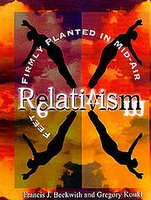
The most quoted and well known bible verse in our day is not the clear salvation message of John 3:16. Rather, the most often cited words of the bible are "Judge not..." (Matt 7:1) This is used by both non-Christians and Christians alike, but usually it is touted in our culture as a catch all to shield us from having our sin exposed basically. Where I ask do all the pop phrases that we hear so often in dialogues with non-believers come from? such as: "I prefer to see God as a God of love", or "That's just your truth." or"My opinion is valid."
All of these phrases come from a post-modern handling of truth. It is truth that is the issue, truth about God, truth about morality, truth about the nature of truth itself. Post-modern relativistic handlings of the truth see themselves as "tolerant" and all inclusive. This all inclusiveness is the natural outworking of being in a mixed culture where there are hundreds of different philosophies, and religions all different. It would seem the height of arrogance to stand up and say "You are all wrong...X is the truth!" and indeed that would be arrogant if truth is relative.
So what are we left with? We are left with man to make God in the image he likes, maybe borrowing from Christianity, a little New Age, a dash of Pagan philosophy and we have our God. It will be different for all of us, because we are all on our own journey with God, no ones journey is inherently wrong because no matter what we are on the journey. Above all no one has the right to stand up and say that what we are doing is wrong. So our "spirituality" becomes a private matter (individualistic), something I engage in on my terms.
In such an environment moral judgment is impossible. It is impossible to stand up and say that homosexuality is wrong, that is judging. All morality is reduced to the will of the people 51%, what may be wrong in our culture today may not be 20 years from now. More importantly is the indivualism of morality. If we treat truth and "spirituality" in a to each his own fashion the natural outworking is to do the same morally. The pop phrase I hear is "Who cares about "X" action as long as you aren't hurting anybody." this is individualistic morality to the T. Just don't hurt people and all is permissible.
Sadly, much of evangelicalism in facing this cultural onslaught of spiritual pluralism has chosen to cater to it rather than to confront it. This is seen in the "seeker-sensitive" movements where big churches are built by basically mimicking the world through entertainment and preaching an all loving God with no wrath or hatred of sin. Messages from pulpits are made to make people feel good about themselves, give them therapeutic/psychologized techniques (usually 12 steps) to enhance their lives (journey). This is in contrast to the message of the cross which calls sinners to repentance to trust in the crucified Jesus alone for salvation, this message is a message of repentance and life change not life enhancement. The seeker-sensitive stick with the enhancement message (may even use the bible) because it really is what the culture wants in the age of "spirituality". After all a message "repent of perish" sounds judgmental doesn't it?
Christian reply to the spirit of the age:
I think in light of the to each his own kind of relativism we need to maintain a true and false, black and white, right and wrong message. By doing so and proclaiming the gospel message in such a way we are being counter cultural. We need to do the very thing that seems so unnatural in our culture...tell people they are wrong. We don't need to be nasty about it, but if we are to be biblically counter cultural we will do this. To do so is to make a judgment, a righteous judgment.
So what is up with this "judge not" stuff anyway? Lets look at the whole passage:
"Judge not, that you be not judged.
For with the judgment you pronounce you will be judged, and with the measure you use it will be measured to you. Why do you see the speck that is in your brother's eye, but do not notice the log that is in your own eye?
Or how can you say to your brother, 'Let me take the speck out of your eye,' when there is the log in your own eye? You hypocrite, first take the log out of your own eye, and then you will see clearly to take the speck out of your brother's eye." (Matt 7:1-5)
Clearly the judging Jesus refers to is as v5 says hypocritical judgment. So we must be conscious of our own sin before we call a person on theirs. Paul said a similar thing as he says in Romans as he says:
"Therefore you have no excuse, O man, every one of you who judges. For in passing judgment on another you condemn yourself, because you, the judge, practice the very same things. " (Rom 2:1)
We need to realize that we do the same thing, we see a bad attitude in a friend we need to remember we do the same before we say anything. We see homosexuals championing their sin, we need to remember our own sexually sinful deeds or thoughts (gay or strait) before we judge. Christ who Himself judged (see Matt 23!) goes on to say after we check our prone to hypocrisy hearts then we can remove the speck in our brothers eye (which requires judgment that there is a speck there). This is what is going on here, not some statement rendering moral judgments to be wrong. If that were the case then the statement "Judge not" would be self contradictory, and it is in the way people use it exp:
1) It is morally wrong to pass moral judgment on others
2) Therefore statement 1) is wrong because it is passing moral judgment saying it is wrong to judge.
So for those who like one liners...When you say that somebody's behavior is sinful and they say its wrong for you to judge you can say...that's an interesting judgment. Greg Koukl has a funny story related to this as he writes about how while giving a lecture on relativism a young lady in the Q&A asked "Who are you to Judge?" of course she didn't expect an answer this was one of tose post-modern trump cards. Koukl responds:

"I certainly do have a right to make moral judgments. I am a rational person who is aware of certain fundamental principals of logic and reasoning. I think I am qualified." At this point the girl is shocked, continuing, "Your claim that I have no right to make judgments is itself a judgment about me. Your claim, therefore, is self refuting." (Relativism, Koukl p.12)
Rather than cave in to the pluralism and relativistic spirit of the age that is dominating the culture, by appealing to felt needs and the journey mentality of "spirituality" which is a kind of eclectic gumbo, we need to speak in a different way. We need to speak in a way that cares about truth, that will call sin sin, call a spade a spade, and God God. A type of proclamation that will not buy into "We're not that bad and God's not that mad." but one that is sold out for the truth that "There is no other name under heaven by which men may be saved except the name of Christ Jesus." (Acts 4:12)









1 comment:
Great Post Bob!
It's the "non-judgmental" "loving" and "tolerant" folks who sure are intolerant and judgmental of us for our views, huh? They are such hypocrites by their own standards.
This is what really gets me when people quote that verse in Matthew 7:1 "Do not judge, or you too will be judged..."
Well in Matthew 7:6 (just a few verses after Jesus said "Judge Not") it says this - "Do not give what is holy to the dogs; nor cast your pearls before swine."
Hmmm? Jesus calling people dogs or swine...that sure is judgmental of Him to say - wonder what He meant by that?
So the homosexuals are right in saying that they shouldn't judge since they have a huge log in their eye full of sexual immorality...now if they will remove that plank then it's okay, but until then they need to stop judging others cause surely they cannot see clearly to judge with righteous judgment.
Take Care -
Post a Comment